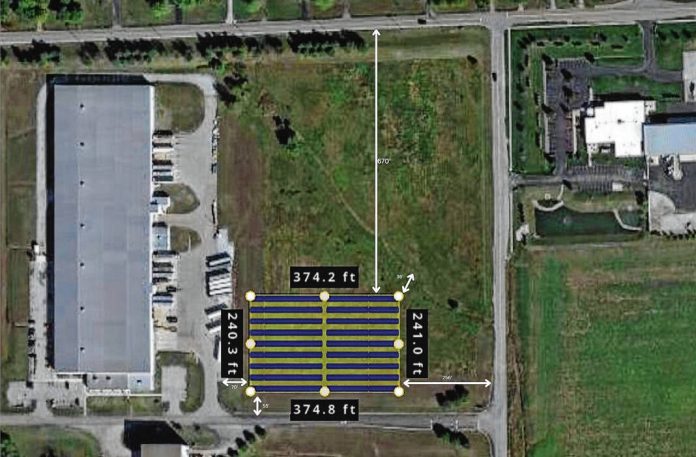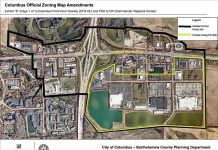
Photo provide Diagrams provided by Toyota Material Handling showing the site for a proposed solar array on the manufacturer’s property.
A local manufacturer is proposing to install a solar array that will provide power to one of its plants and is expected to produce more than 1.4 million kilowatt-hours (kWh) of clean energy per year.
Toyota Material Handling is requesting development standards variances to allow the array, which is an accessory structure, to be located in a front yard and to allow a fence in a front yard to be 8 feet tall, which is 4.5 feet taller than the standard maximum height. The location of the proposed project is 5620 S. County Road 175W in Columbus.
The two requests will be considered at a Columbus and Bartholomew County Board of Zoning Appeals Hearing Officer meeting, which will be held at 4 p.m. Tuesday in the Columbus City Hall council chambers.
According to a variance application from Toyota and Emergent Solar Energy, a commercial solar development firm headquartered in West Lafayette, the plan is to install a “960-kilowatt peak fixed-tilt ground solar array” in an empty lot located in the frontage of TMH Plant #3 along County Road 175W, with a footprint of 2.28 acres.
Toyota Material Handling will be the owner and operator of the solar system and main “off-taker” of the energy it generates. In the event that there is any minimal excess power produced by the array, it would be exported across the REMC utility meter and purchased under a solar interconnection agreement.
“This solar array will produce 1,438,152kWh’s of clean energy per year, which will directly replace electricity from the grid that would have been produced in a coal-fire plant,” the firm wrote. “The clean energy provided to the Toyota plant could be considered a benefit to the local community. If this solar project does not provide a net tangible benefit to the community, then it certainly is not a detriment to the welfare of the community.”
Additionally, the company stated that there is no other location on Toyota’s property that would be appropriate for a project of this nature, and the roofing on Toyota’s buildings would not be able to bear the weight of a solar array.
Per the variance application, the proposed 8-foot chain link fence is needed to “eliminate public safety concerns,”prevent intruders from entering the solar pv array footprint, and protect the company’s investment in renewable energy.
In late 2022, the Bartholomew County Plan Commission approved an ordinance on commercial solar energy systems after much debate from members of the public about how stringent regulations should be.
However, this ordinance does not apply to the site in question, as it is located within Columbus city limits. Furthermore, City/County Planning Director Jeff Bergman confirmed that even if the property were located in the county, Toyota’s proposal would not fit the definition of a commercial solar energy system.
The county ordinance defines the term as “a system that captures and converts solar energy into electricity for the primary purpose of wholesale sales of generated electricity and for use in locations other than where it is generated.”
“This definition does not include residential or other uses with solar arrays capturing solar energy for primarily on-site use, with any excess amounts supplied to the electrical grid,” the ordinance states.
“Technically, in the words of the zoning ordinance, they’d (the proposed solar panels) be accessory structures in a front yard,” said Bergman. “So that’s not something that’s specific to the fact that they’re solar panels. If it were some kind of small storage building or some other accessory structure, they’d have the same request.”




